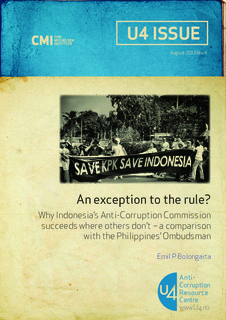An exception to the rule? Why Indonesia's Anti-Corruption Commission succeeds where others don't - a comparison with the Philippines' Ombudsman
Research report
Permanent lenke
http://hdl.handle.net/11250/2474704Utgivelsesdato
2010-08-17Metadata
Vis full innførselSamlinger
- Publications [1488]
Originalversjon
Bergen: Chr. Michelsen Institute (U4 Issue 2010:4) 34 p.Sammendrag
Anti-corruption agencies have long been a principal strategy to fight corruption in many developing countries. Unfortunately, few of them have produced evident results and they are seen as being rather ineffective. Recently, however, the Corruption Eradication Commission of Indonesia (KPK) seems to have emerged as an exception. Can this success be substantiated and, if so, how can it be explained? A comparison with another such institution in a very similar neighbouring country – the Office of the Ombudsman of the Philippines – illustrates the KPK’s success especially in investigating and prosecuting corrupt public officials. Why was the KPK, in just five years, able to reach a 100% conviction rate against top officials in all major branches of the Indonesian government, while the Philippine Ombudsman has scored only few convictions in its 20-year history? Part of this success can be explained by considerable investigative powers given to KPK, which the Philippine Ombudsman does not hold. Also, rigorous pre-testing of every prosecution and a highly efficient anti-corruption court contribute to KPK’s success. These and other factors are analysed in this U4 Issue, which concludes with recommendations for donors and governments on the establishment and strengthening of anti-corruption agencies.
